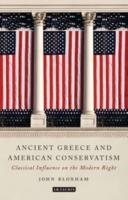
I.B. Tauris (2018) h/b 296pp £75 (ISBN 9781788311540)
This is a fascinating book. Perhaps more fascinating for political scientists studying the rebirth of the American right than for students of Plato and Aristotle. Nonetheless it’s a first-class critique of how conservative thinkers in post-war America turned back to the ancient Greeks in their challenge to liberal relativism. It charts the right’s revival from the writings of Richard Weaver and Leo Strauss, through Eric Voegilin and Willmoore Kendall, through the neocons such as Irving Kristol and Robert Nisbet, Russell Kirk and Donald Kagan, and on to more familiar figures of our era: Allan Bloom, Charles Murray and Francis Fukuyama.
And, with one exception, John Bloxham captures it all: the depth of their immersion in Plato and Aristotle; the Pythonesque division between East Coast Straussians and West Coast Straussians; the culture wars waged by Allan Bloom and William Bennett (Reagan’s Education Secretary); the tortuous justification for foreign policy interventions like Iraq; right up to Trump’s 2017 Warsaw speech and today’s looming tensions with China.
In the late 1940s and 1950s the right in America was adrift looking for sheet anchors. 1948 saw the fifth Democratic presidential victory in a row. The spending and regulation of the huge state apparatus that had won the Second World War sent the leading lights back to their Greek texts. For Weaver it was Plato, in particular Timaeus and Phaedrus; for Strauss it was Xenophon, especially the Oeconomicus. They and their disciples searched for the antidote to moral relativism in traditional values, property rights, education and the role of elites.
Though Hayek’s Road to Serfdom and Popper’s The Open Society and its Enemies were influential, American Conservatives were as wary of true libertarians as they were of socialist perfectionists. What they revered was the ancient idea of natural right and a belief in eternal inherent human traits. They turned to the ancient philosophers to help refute modernists from Hobbes and Mill onwards, indeed all of them: ‘the eighteenth-century rationalists, the nineteenth-century positivists, and the twentieth-century ideologues’. By the 1960s Young Republicans could display that intellectual underpinning on their lapel badges: Don’t Immanentize the Eschaton. They were at the walls of Kennedy’s Camelot. By 1972 Strauss, Nisbet, Milton Friedman, even Gordon Brown’s favourite moralist Gertrude Himmelfarb, were signing the famous New York Times advert backing Nixon against McGovern.
Despite Friedman they were never purist free marketeers: the 1970s neo-cons wanted instead to couple the power of state with the market economy to help ‘elevate’ society towards the stronger ties of family and religion. For their cultural wing, the challenge therefore was to restore western values: Bloom (The Closing of the American Mind 1987) and Bennett (Our Children, Our Country 1988) defended both moral absolutism and the superiority of western art and literature, even in the sensitive areas of race and colour.
It was a campaign that petered out. The left always had the commanding heights—the arts and their funding, most of the universities, the primacy of diversity. Reagan himself was not blind to social change; and the right went off into the more promising territory of tax cuts and stronger defence.
Foreign policy proved the real test of American exceptionalism. Was America really going to be Rome in decline, losing its grip on whole regions of the globe? Or, having won its supremacy, was it not duty-bound to use its hegemony not just to protect the weak and itself but to advance its own democratic values, through regime change? The long-drawn out interventions in both Afghanistan and Iraq saw the neo-cons increasingly deploying the concept of a benevolent Athens against the rhetoric of Roman imperialism. Fukuyama famously concluded that even Islam would in the end have to capitulate to some form of liberal democracy.
The winner in all this isn’t any of the ancient philosophers: it’s Thucydides. His Peloponnesian War became the bible: its muscular case for interventionism seeded the Bush doctrine, and reinforced the war hawks more concerned with the morality of ends rather than of means; its musings on the nature of power were pored over by the Sino-analysts; the speeches were read all over again by Trump men like Steve Bannon and Generals McMaster and Mattis, climaxing in a sub-Periclean passage in Trump’s Warsaw speech (2017):
‘We write symphonies. We pursue innovation. We celebrate our ancient heroes, embrace our timeless traditions and customs, and always seek to explore and discover brand new frontiers. We reward brilliance. We strive for excellence, and cherish inspiring works of art that honour God. We treasure the rule of law…’.
The surprising gap in Bloxham’s otherwise comprehensive tour de force is Vietnam. It was that war that surely undermined the intellectual champions of Athens as well as those of Rome. Though later Conservatives claimed that afterwards the dominoes did not in fact fall—the rest of south east Asia stayed more or less democratic—the conduct of the war itself destroyed any claim to moral imperialism and its shadow hung over US foreign policy for a generation.
That apart, there is much for all of us to learn from this book, not least in giving reception studies back their good name.
Sir Michael Fallon
Secretary of State for Defence 2014-17
